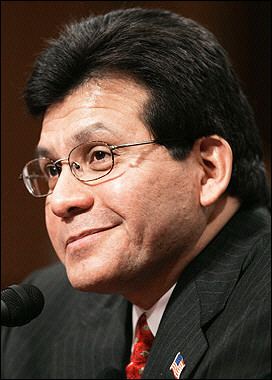http://www.whitehouse.gov/news/releases/2005/07/20050716.htmlTHE PRESIDENT: Good morning. Under the Constitution, I have the responsibility to nominate a successor to Supreme Court Justice Sandra Day O'Connor. This past week I met with Democratic and Republican leaders in the United States Senate and sought their views on the process, and their thoughts on the qualities to look for in a potential nominee. Also, my staff has talked with more than 60 members of the United States Senate. Members of the Senate are receiving a full opportunity to provide their opinions and recommendations, and I appreciate their advice.

I will be guided by clear principles as I make my decision. My nominee will be a fair-minded individual who represents the mainstream of American law and American values. The nominee will meet the highest standards of intellect, character, and ability, and will pledge to faithfully interpret the Constitution and laws of our country. Our nation deserves, and I will select, a Supreme Court justice that Americans can be proud of.

The American people also expect a Senate confirmation process that rises above partisanship. When I met with Senate leaders, we discussed our shared goal of making sure that the confirmation process is dignified. The nominee deserves fair treatment, a fair hearing, and a fair vote. I will make my nomination in a timely manner so the nominee can be confirmed before the start of the Court's new term in October.

The experiences of the two justices nominated by President Clinton provide useful examples of fair treatment and a reasonable timetable for Senate action. In 1993, the Senate voted on and confirmed Justice Ruth Bader Ginsburg to the Supreme Court 42 days after President Clinton submitted her nomination. And despite the significant philosophical differences many senators had with Justice Ginsburg, she received 96 votes in favor of confirmation.

The following year, Justice Stephen Breyer was confirmed 73 days after his nomination was submitted, with 87 votes in his favor. Again, Republican senators in large numbers voted for confirmation of Justice Breyer despite significant philosophical differences. These examples show that the thorough consideration of a nominee does not require months of delay.

As we continue the process to fill the opening on the Supreme Court, we are also moving forward on other important priorities for the American people. This past week, we received more good news on the economy. The 2005 deficit is projected to be $94 billion less than previously expected. I told the Congress and the country we would cut the deficit in half by 2009. This week's numbers show that we are ahead of pace, so long as Congress acts wisely with taxpayer dollars.
This good news on the budget is coupled with other news that shows the economy is strong and getting stronger. Our economy is growing faster than any other major industrialized nation. The unemployment rate is down to 5 percent, lower than the average rate of the 1970s, 1980s, and 1990s. We have created more than 2 million jobs in the past 12 months. More Americans are working today than ever before in our nation's history, and home ownership in America is at an all-time high.
To keep our economy growing and creating jobs, Congress needs to continue working in the upcoming weeks on our pro-growth economic agenda. First, for the sake of our economic security and our national security, the Congress must complete its work on a good energy bill that will reduce our dependence on foreign sources of energy.